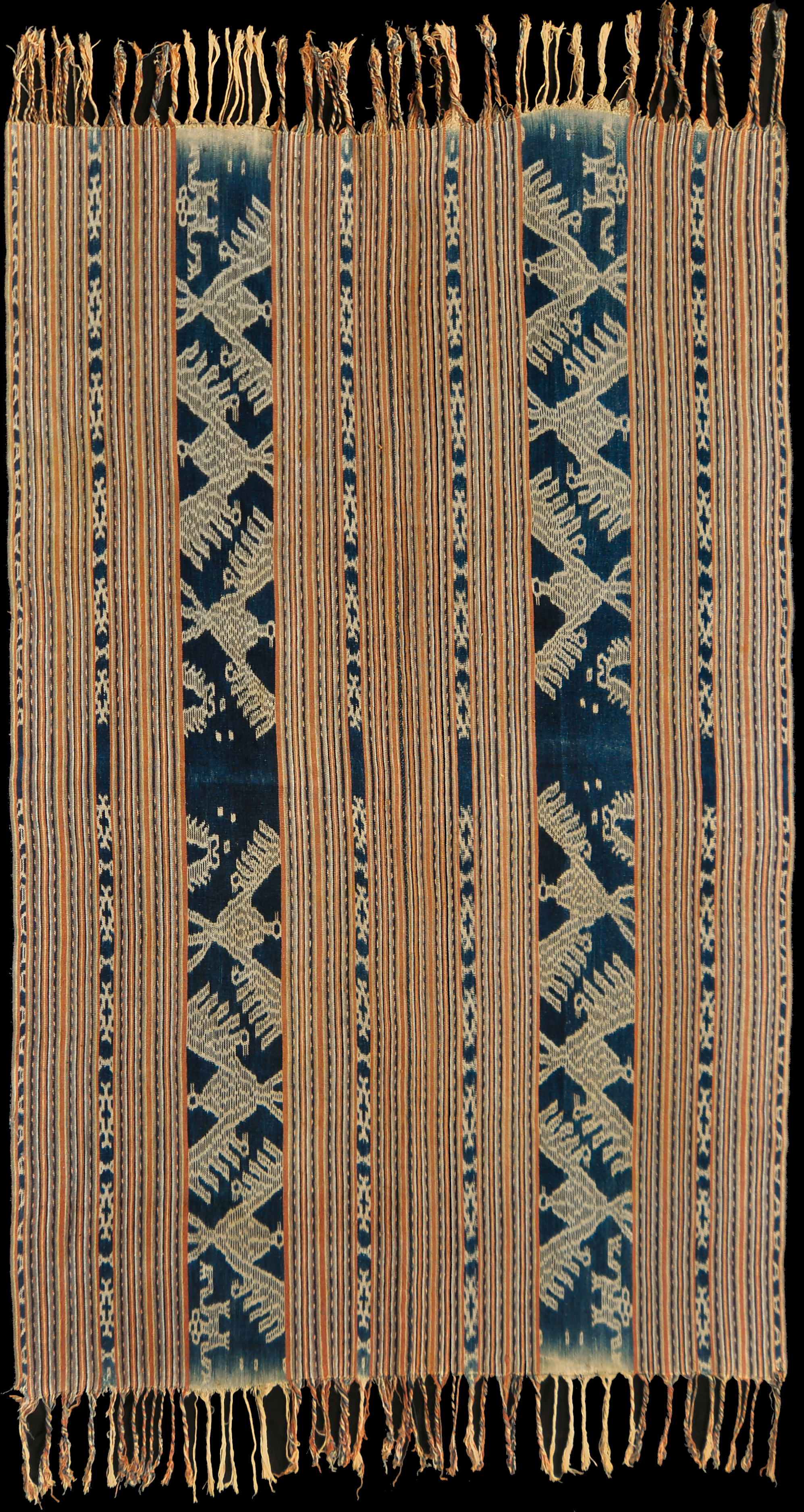| |
 mouse over to magnify mouse over to magnify
| | | | 258 Timor, West Timor
Mau naek (men's wrap)
| | Locale: | Niki-Niki in Amanuban most likely, else Insana | | Period: | 1900-1930 | | Panels: | 2 | | Design: | Asymmetric. Wrap in two panels of the type Yeager & Jacobson call �Multiple Design Stripe Selimuts�, which is found in mid-northern West Timor. Numerous longitudinal ikated bands. The two widest of each panel, visually divided in two sections, carry three bird motifs each, two flying inward and one outward. These represent teme, falcons. While depictions of roosters and jungle fowl are common in West Timor, especially in Insana, falcons are represented only rarely. They symbolize the power of the nobleman and his protection of the common people (Stuart-Fox 2020, citing Kase, pers. comm.). Also present are two human figures with upraised hands and an arched motif of unknown significance. Numerous narrower ikated bands, the four widest of which carry a motif similar to the boda of Savu, which is occasionally seen on Timor ikat, and may well be a stylized crocodile. Note that large men�s wraps are called mau naek in Amanuban, beti naik in Insana, the cloth�s alternative origin. On each panel, four square white dots are placed next to the plain bar that marks the horizontal axis, two on either side. On side they are more or less aligned, on the other they are positioned at a slant. As a result it becomes obvious that the two panels have been joined in opposition�and that de placement of the dots was intentional. � | | Size: | 102 x 160 cm (40.1 x 62.9 in) | | Weight: | 720 g (441 g/m2) | | Yarn: | Cotton, hand-spun, medium | | Comment: | Early men�s shawl with exquisite styling, which must have graced noble shoulders. Hand spun cotton, all natural dyes�even the pinstripes�and drawing of a charming naivety. The orant figures are found in Amanuban, especially in Niki-Niki, as well as in Miomafo. As usual, the whites have not simply been reserved in their entirety, but spickled with short bars giving them a pale blue tint. This artistic choice implied a vast increase in the number of bindings. The detailing of the falcons� wings, down to showing six feathers per wing, is uncommonly fine. The excellent alignment of the warp produces sharp outlines, even at a distance. As commercial thread came to this region early, the fact that the cloth is made entirely in hand-spun cotton is an indicator of substantial age.� | | Background: | Additional information in chapters on Timor and West Timor. | | Published: | Ikat Textiles of the Indonesian Archipelago, 2018. | | Compare: | 094 132 282 287 | | Sources: | This specimen is similar to a beti shown in Yeager & Jacobson (2002: Plate 51), though with very different styling of the bird motif, and probably a different type of bird. The authors also show a more sketchy flying bird motif from Insana (ibid.: Fig. 49h, as well as another one, also less well defined, from Amanuban (ibid.: Fig. 50e, 100e). Remarkable is a small motif identified as representing a crocodile, which is similar to the Savunese boda motif (ibid.: Fig. 100e). Stuart-Fox published an article (2020) on a Niki-Niki specimen with the hawk motif in his collection. Its overall patterning, with the birds placed in direct opposition, heads touching, is more similar to the treatment seen in an early shawl from the same region in the Wereldmuseum collection (TM-1964-45). The drawing style in the main motif is very similar to that on a late 20th scarf from Niki-Niki in the collection of Timor field-collector Aja Bordeville. David Stuart-Fox published an article on another Niki-Niki specimen with the falcon motif in Tribale Kunst Vol. 8-3 (2020), titled 'Een onverwacht geschenk: een zeldzame ikat uit Niki-Niki, Centraal Timor'. | | |
 ©Peter ten Hoopen, 2025
All rights reserved.
|
|


